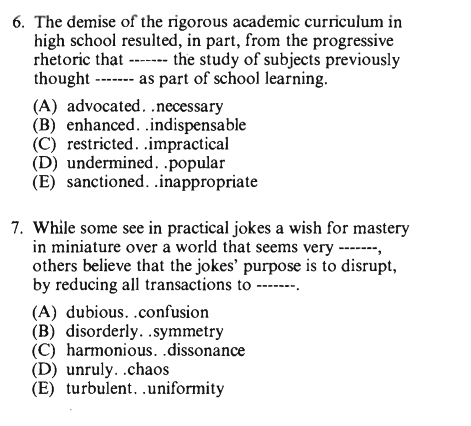
These two stumped me in Test 13, BB. I spent a good 5 mins combined on both, but still selected the wrong answer. Anyone care to describe how they approached these two TCs?

These two stumped me in Test 13, BB. I spent a good 5 mins combined on both, but still selected the wrong answer. Anyone care to describe how they approached these two TCs?
Can you tell your thought process ?
Through process of elimination. E is the only one that works when you’re talking about a negative situation (the rigorous academic curriculum declining). If it were B, for example, it wouldn’t make sense because enhancing indispensable subjects wouldn’t make the rigor of an academic curriculum decline. Same with A and C. D might be appealing but popularity doesn’t have enough to do with rigor of a curriculum. “Sanctioning” (approving) subjects previously seen as inappropriate? That certainly seems like something that would cause academic decline! E
“A wish for mastery over” -> People usually want control over what? -> Something chaotic or unruly. (first blank)
There’s a contrast set up here (key word: While), so you want the opposite of “control over someting unruly”. There is also a hint in the word “disrupt”. So you want a word that is both the opposite of control, and a synonym for disruption (for the 2nd blank). Chaos works. Thus, D
Thanks for the explanation.
For me, 6) is saying: The rigor of the curriculum is no more partly because progressive rhetoric that ___ the study of subjects previously thought ____ as part of school learning.
How can progressive rhetoric contribute to the demise of the rigor of the curriculum? Either by 1) putting forth something that was previously bad. Or, by 2) stopping something that was previously good.
Is [E] a reflection of the 1) choice? I guess I’m confused about what the word “previously” does to the sentence. I originally chose [B] because I thought the demise was because progressives restricted subjects that were previously thought as not good for learning. If they were previously thought of as not good for learning, then they are now thought of as good for learning, so they shouldn’t have restricted it.
What would @gregmat do for this one?
For 7), I had a similar struggle. I understood that there should be a contrast because “while” sets up a comparison control and chaos. On the one hand, some see practical jokes as a way to control chaos. On the other hand, some see it as a way to disrupt, by reducing all transactions to “something that should be opposite chaos?”
That’s why I chose [E], but I’m having a hard time understand how I can arrive to [D].
Does “seem” have something to do with it? Like seemingly unruly, but actually not? and that’s why the second blank is chaos? I need help. lol.
Yes I think E is a reflection of the 1) choice here. I read it as people behind the new “rhetoric” are introducing subjects that everyone has always thought were… useless. I imagined them replacing algebra with underwater basket weaving or something.
I originally chose [B] because I thought the demise was because progressives restricted subjects that were previously thought as not good for learning.
This doesn’t work because B’s first blank is enhance rather than restrict.
So you get (paraphrased):
“Some people think jokes should be a form of mastery over a world that seems very ____.
Others believe that jokes should disrupt, and reduce the world to ____.”